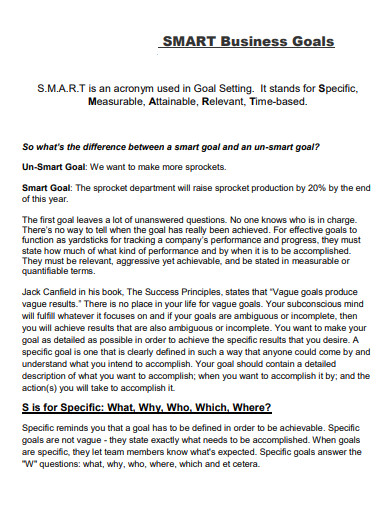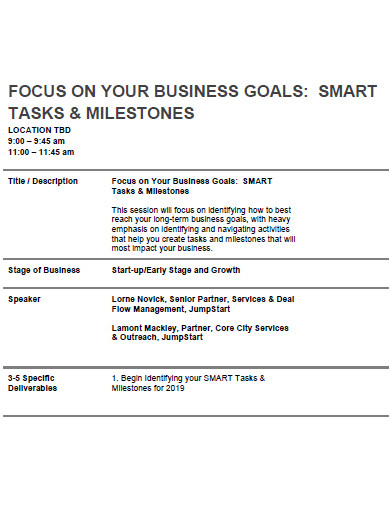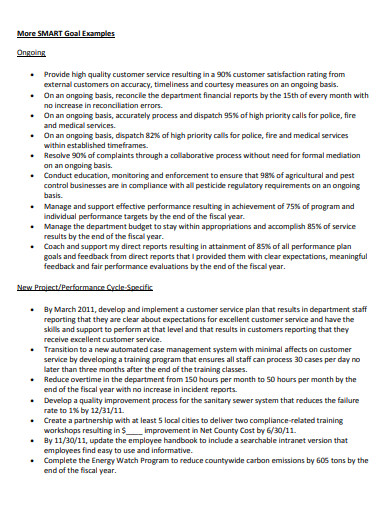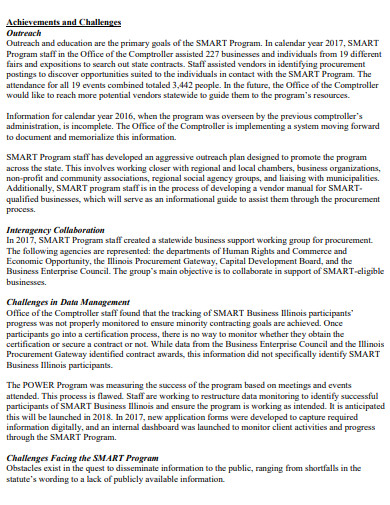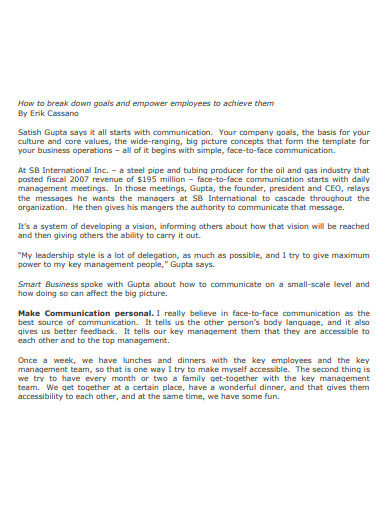6+ SMART Business Goals Examples
If you want to obtain a successful business, you need to prepare effective strategic goals. This has to be accompanied by the objectives of your organization so that you will always be guided. Using a smart goals maker can help streamline the process of defining and refining those strategic goals. However, there are still a lot in the business industry that does not focus themselves over a specific goal. Smart goal templates offer a structured approach to ensure clarity and consistency in goal-setting across teams. The success of every business will depend on the company’s ability to set a specific goal. Track your business goals with the use of SMART goal setting which enables you to go through your main goal and get the desired result. In this article, you will be able to know more about what a SMART goal setting is and how to create one.
6+ SMART Business Goals Examples
1. SMART Business Goals Template
2. Sample SMART Business Goals
3. SMART Business Goals Format
4. SMART Business Goals Worksheet
5. SMART Business Goals Example
6. SMART Business Goals in PDF
7. Printable SMART Business Goals
What does SMART stands for?
SMART goal setting stands for Specific, Measurable, Attainable, Relevant and Time-Based. It is one of the most effective method in obtaining a specific business goals. This will help you become more specific with the details of your plans, achieve your target market or result for your business and even assess your progress towards your goals.
Specific
Goals should be properly defined. It should be more meaningful and pushes you to create goal power. Your goal will be your magnet that pulls your business and your resources. You should be able to give more focus to generate more power.
Measurable
Numbers are always considered to be an essential part in the business. When you put numbers especially into the data, always make sure that it is concrete. This will also help you keep yourself on track to your goal.
Attainable
There is no harm in having a huge dream for your business. That is why you set goals. However, it is always important to see to it that your goals were all attainable and realistic.
Relevant
When you are going to have a goal, make sure that it is based on the current condition of the business. See to it that you are coping with the realities in the market.
Time-Based
Your business objectives should have a time frame that is tied into the process. Always make a time frame whenever you start achieving a specific goal. You may even consider breaking down the tasks and accomplish them one by one. Review your goals if necessary.
Examples of SMART Goals
Example #1:
Within a month, I am going to get set up to sell handmade cards on Etsy, which will allow me to benefit financially from my favorite hobby. Within six weeks, I will have an inventory of 30 handmade cards to sell and aim to sell a minimum of five cards per week, building customer relationships through word of mouth, referrals, and local networking.
- Specific: I will acquire three new clients for my consulting business.
- Measurable: I will measure my progress by how many new clients I bring on while maintaining my current client base.
- Attainable: I will ask current clients for referrals, launch a social media marketing campaign and network with local businesses.
- Relevant: Adding additional clients to my business will allow me to grow my business and increase my revenue.
- Time-Based: I will have three new clients within two months.
Example #2:
I will acquire three new clients for my consulting business within two months by asking for referrals, launching a social media marketing campaign, and networking with local businesses. This will allow me to grow my business and increase my revenue.
- Specific: I will write a book about social media that is a minimum of 150 pages.
- Measurable: I will write one chapter per month or three to five pages per week.
- Attainable: I will work on the manuscript first, and once that is completed, I will begin to search for a publisher or explore self-publishing.
- Relevant: Writing a book on social media will help me establish myself as an expert.
- Time-Based: My manuscript will be completed and ready to be published in 10 months.
FAQs
What are the do’s in setting a SMART goal?
You should be specific and be able to challenge your team’s limitations. Select only the type of goals that are relevant for strategic planning. Set a time frame and be flexible when it is necessary to have adjustments on your goals.
What are the don’ts in setting SMART goals?
Do not set goals that are not even attainable. Do not go for perfection. Lastly, do not lose track of the big picture. You might miss the main objectives of your goals.
When can you tell that you are following the SMART goals?
You should at least meet the all the five criteria. It can be broken into sub goals to make it even more attainable.
Having goals are part of every business industry. It helps in providing direction and clear focus. A SMART goal incorporates all these criteria that will help you gain more focus and increase your chance of achieving your goal. SMART goals lead you to success as long as you make your goals specific, measurable, attainable, relevant and time-based.



